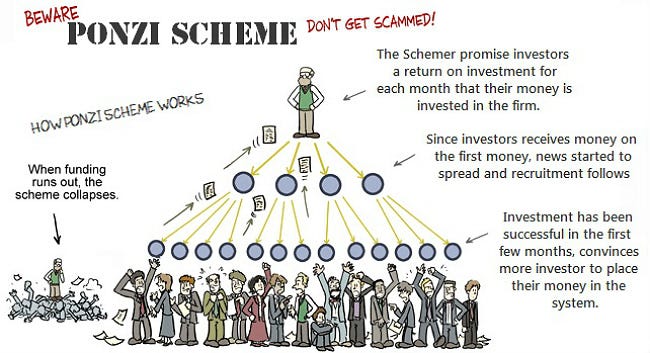What is a Ponzi Scheme?
In my last post, I talked about "Bitcoin Doublers" and why they're just run by despicable scammers looking to snatch your money. Yet, in some circumstances, users may receive their promised profits back. Many gullible people then view these sites as a legitimate, reliable source of income. But they're wrong. One must know that a paying site isn't always legitimate. Today, I'll talk about these scams, known as "Ponzi Schemes" and how to spot and avoid them.
Charles Ponzi, whom the Ponzi scheme was named after.
The Ponzi scheme was named after Charles Ponzi, an Italian conman who devised the scheme in January 1920 in Boston. He started a company, claiming to be trading postal coupons for profits as high as 400%, while providing an extremely lucrative investment plan of 50% interest after 45 days. The earliest investors received their promised profits without delay, and word spread quickly about Charles Ponzi's investment company. Only 5 months after launching, the amount invested in Ponzi's scheme had reached 2.5 million USD (30 million nowadays). A month later, the money deposited had hit $1 million PER DAY!
Little did the investors know that, Charles Ponzi was simply paying old deposits with the money from new ones! He was doing nothing related to "postal coupon trading" and was just switching the money around and around to maintain the program.
Charles Ponzi, whom the Ponzi scheme was named after.
The Ponzi scheme was named after Charles Ponzi, an Italian conman who devised the scheme in January 1920 in Boston. He started a company, claiming to be trading postal coupons for profits as high as 400%, while providing an extremely lucrative investment plan of 50% interest after 45 days. The earliest investors received their promised profits without delay, and word spread quickly about Charles Ponzi's investment company. Only 5 months after launching, the amount invested in Ponzi's scheme had reached 2.5 million USD (30 million nowadays). A month later, the money deposited had hit $1 million PER DAY!
A Ponzi scheme can only keep running if there are more investors to sustain it. As in Charles Ponzi's example, his scam was eventually exposed in August, having owed millions of dollars in debt and unable to reapy his investors. Ponzi schemes are still pretty common on the Internet. Many of them disguise themselves as "cloud mining", "high yield investment programs" or simply sites that require you to buy "membership upgrades" before being able to withdraw your money. Some people actually try to make profit by investing in an early stage and cashing out before the whole thing collapses. However, this is more like of a risky gamble as poor timing can result in a major loss of funds. In fact, the only way to make guaranteed profit in a Ponzi scheme is to not even invest a single cent, but make tons of referrals through your affiliate link so you get the free juicy commission for nothing. This practice is considered as quite unethical and people who do this are usually frowned upon by the Internet community. The United states Securities and Exchange Commission has a guideline for identifying Ponzis:
- High investment returns with little or no risk. Every investment carries some degree of risk, and investments yielding higher returns typically involve more risk. Any "guaranteed" investment opportunity is often considered suspicious.
- Overly consistent returns. Investment values tend to go up and down over time, especially those offering potentially high returns. An investment that continues to generate regular positive returns regardless of overall market conditions is considered suspicious.
- Unregistered investments. Ponzi schemes typically involve investments that have not been registered with the SEC or with state regulators. Registration is important because it provides investors with access to key information about the company's management, products, services, and finances.
- Unlicensed sellers. Federal and state securities laws require that investment professionals and their firms be licensed or registered. Most Ponzi schemes involve unlicensed individuals or unregistered firms.
- Secretive or complex strategies. Investments that cannot be understood or do not give complete information.
- Issues with paperwork. Excuses are given regarding why clients cannot review information in writing about an investment. Also, account statement errors and inconsistencies are frequently signs that funds are not being invested as promised.
- Difficulty receiving payments. Clients have failures to receive a payment or have difficulty cashing out their investments. Ponzi scheme promoters routinely encourage participants to "roll over" investments and sometimes promise even higher returns on the amount rolled over.
I hope you guys have learned about Ponzi Schemes and how to identify them after reading this article. Unless you're willing to lose your cash for nothing, NEVER INVEST IN ANY OF THEM AT ALL COSTS, NO MATTER HOW LUCRATIVE IT LOOKS . Keep checking this site for regular updates!



No comments:
Post a Comment